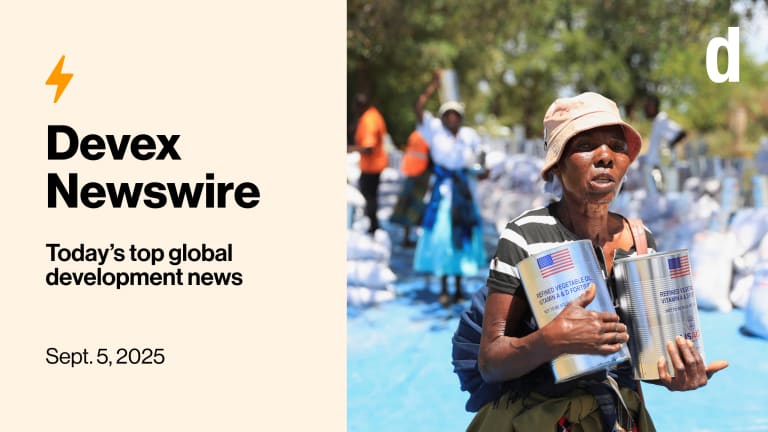
In an attempt to further clarify and improve Australia’s revamped — yet still controversial — aid program, the Senate has released a detailed report including recommendations on how the Abbott government can push its official development assistance to be more effective, efficient and impactful.
One such recommendation is to clarify the real intention of the country’s aid program following the integration of AusAID into the Department of Foreign Affairs and Trade, that sparked stakeholders — aid agencies and humanitarian organizations alike — to question whether national and commercial interests may undermine humanitarian goals.
Indeed, such doubts could jeopardize Australia’s leading role in international development and influence especially in Asia-Pacific, according to the country’s upper house of parliament.
“Overseas aid should not be viewed as a ‘political football’ and the aid budget should not be utilized for short-term financial or political reasons,” the Senate Foreign Affairs, Defense and Trade References Committee said in the report.
The report further explained how Australia can “do more” in development, bearing in mind its “responsibility as a successful and wealthy nation to continue to provide leadership in promoting assistance to communities in developing countries.”
Further, the report asserted that assisting the world’s poorest to break out of extreme poverty should be “the primary objective of Australia’s aid program.”
It has been 6 months since Prime Minister Tony Abbott announced his intention to cut the country’s ODA and integrate its aid agency within DFAT. However, according to several aid groups, a number of questions remain unanswered, despite foreign minister Julie Bishop’s announcement in January that gave a glimpse of the “details” of the cuts.
And this clarification issue is just the tip of the iceberg.
Issues such as the employment status of staff members of the now-defunct AusAID and what specific programs and NGOs will be cut off from funding or receive less money remain unclear, spurring anxiety within the country’s bureaucracy and Australian overseas aid staff.
Aside from the Senate inquiry, the country’s parliament is also planning further probes and public hearings on two other issues: how to better protect women and girls’ rights, how to increase the role of business in aid to improve the country’s ODA, and answer calls for more stakeholder discussion in pushing aid forward.
Recommendations
The committee published a total of 24 recommendations, among them the clarification of the aid program objectives and the government’s commitment to peg ODA to the internationally-agreed 0.7 percent of the country’s gross national income.
“A lack of strategic clarity in the Australian government’s approach to [the] aid program was evident. [It] should restate its policy objectives … with poverty reduction as the primary consideration,” the report stated. “[We recommend] the development of a bipartisan agreement for the long-term funding of ODA to achieve [the] target of 0.5 percent by 2024-2025.”
The committee also recommended DFAT to immediately outline and identify specific programs in specific countries that would be affected by the funding cuts — a very contentious issue that has several local NGOs on edge because of the uncertainty. In addition, the committee urged clarity on the issue who will be axed in the bureaucracy once the integration process finishes.
“There were still a number of integration issues that DFAT was working through, including what our final numbers are going to be,” DFAT secretary Peter Varghese said in the report, explaining that the sooner this issue is addressed, the better the government will be able to straighten out plans and work smoothly and seamlessly.
Other recommendations pertain to the aid cut details announced by Bishop in January, suggesting that the agency reconsider its stand in terms of increasing — or decreasing — funding for certain issues and sectors.
Among the suggestions under this group is the issue of progress in Africa and Asia-Pacific. The committee recommended a stronger focus in Asia-Pacific given its proximity and need, as well as on Africa given the low development progress in the region.
“The committee recommends [the promotion] of the interests of developing countries in the Asia-Pacific in the post-2015 development agenda discussions [and] reduce funding cuts made to Pacific nations in the 2014-2015 budget,” the report revealed, adding that for Africa, “joining the African Development Bank would represent value for money and be a high-level indication of Australia’s commitment to development in [the region].”
Other suggestions include establishing global strategies and funding mechanisms in several global development issues such as health, gender equality, climate change, and environmental protection, as well as “allocating 10 percent of the aid budget for emergency and humanitarian response” — a timely call following the unprecedented devastation wrought on the Asia-Pacific region alone in the past year.
Read more development aid news online, and subscribe to The Development Newswire to receive top international development headlines from the world’s leading donors, news sources and opinion leaders — emailed to you FREE every business day.
See more:
Australia launches inquiry on role of business in aid
'Culture of accountability' future of Australian aid?
Is aid for trade the way to go for Australian ODA?








